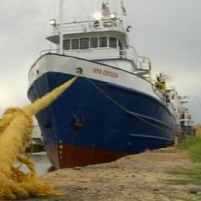For First Time in 50 Years, U.S. Cargo Ship Delivers Goods Directly to Cuba
Sunday, July 15, 2012
 The Ana Cecilia (photo: NBC 6 Miami)
The Ana Cecilia (photo: NBC 6 Miami)
The cargo ship Ana Cecilia, carrying humanitarian goods directly from the United States to Cuba, arrived in Havana Bay on Friday, the first direct shipment since President John Kennedy imposed a U.S. embargo on Cuba in February 1962. He did so as a way of trying to force change on the communist government there, but the regime of the Castro brothers and their associates remains firmly ensconced. The ship, which can hold up to sixteen cargo containers (typically 20 x 8 x 8 ft.), moved only one container on this maiden run, although its owner, International Port Corporation (IPC) in Miami, hopes it will grow into a weekly service.
IPC needed three years to obtain a special permit from the U.S. Treasury Department Office of Foreign Assets Control and the Commerce Department allowing it to make shipments that comply with the embargo. Under its permit, IPC may ship goods Washington considers humanitarian aid, including food, medicine, appliances, furniture and clothes, from authorized groups and from family members. More than 800,000 Cuban-Americans live in Florida, most in the Miami area. The ship charges $5.99 per pound, which is substantially less than the cost of sending items to Cuba indirectly, via foreign ports, which has been going on for years.
The voyage of the Ana Cecilia has been controversial. Cuban-born Congresswoman Ileana Ros-Lehtinen wrote a letter to IPC, asserting that the company is violating the embargo, a contention IPC denies. Ironically, the direct shipments are beginning just as the Cuban government is establishing new duties on imports of food and on non-commercial items like clothing, small appliances and home furnishings, probably as a way to encourage consumption of Cuban-made products.
The U.S. embargo has changed over its half-century of life. Loosened somewhat by President Jimmy Carter, it was strengthened by President Ronald Reagan, and codified into law by Congress in 1992 and 1996. Under pressure from agribusiness firms, in 2000 Congress permitted the cash sale of grain and other agricultural commodities, as well as some medical supplies. In 2009, President Obama relaxed the embargo by allowing Cuban-Americans to travel freely and send unlimited funds to Cuba and by making it easier for Americans in general to travel to Cuba. Widely unpopular in the rest of the world, the embargo has been condemned by overwhelming majorities of the United Nations General Assembly each year since 1992, with an average vote of 130 to 3. The only nations that support the U.S. embargo are Israel, the Marshall Islands and Palau.
-Matt Bewig
To Learn More:
After 50+ Years, Shipping Resumes Between U.S. and Cuba (by Yoani Sanchez, Huffington Post)
Help from Miami Arrives in Cuba (Havana Times)
- Top Stories
- Unusual News
- Where is the Money Going?
- Controversies
- U.S. and the World
- Appointments and Resignations
- Latest News
- Trump to Stop Deportations If…
- Trump Denounces World Series
- What If China Invaded the United States?
- Donald Trump Has a Mental Health Problem and It Has a Name
- Trump Goes on Renaming Frenzy






Comments